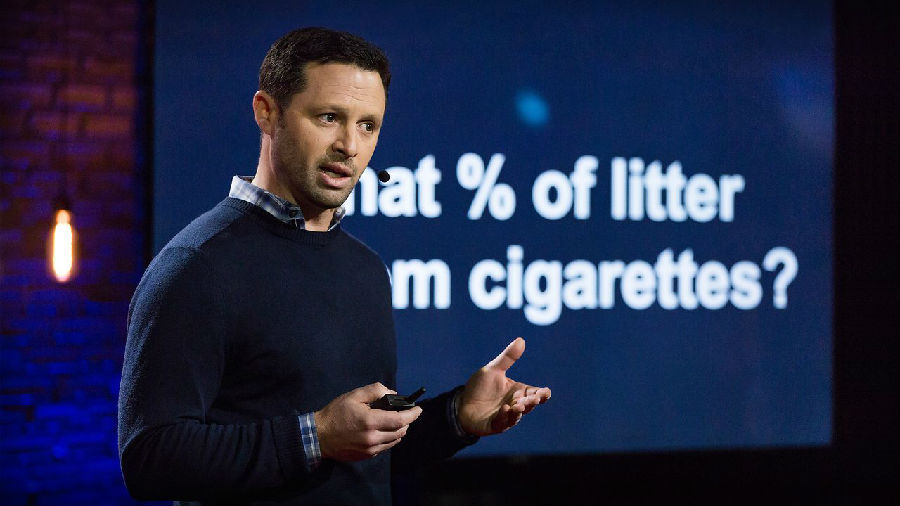(单词翻译:单击)
This story starts with these two -- my kids.
故事是从这两位开始的--我的孩子们。
We were hiking in the Oakland woods when my daughter noticed a plastic tub of cat litter in a creek.
当时我们在奥克兰森林徒步,我的女儿发现河里有个塑料猫砂盆。
She looked at me and said, "Daddy? That doesn't go there."
她看着我说:“爸比?这不应该在这里。”
When she said that, it reminded me of summer camp.
这句话让我联想到夏令营。
On the morning of visiting day, right before they'd let our anxious parents come barreling through the gates,
在开放家长参观日的早上,在着急的家长来到营地门口之前,
our camp director would say, "Quick! Everyone pick up five pieces of litter."
营地指挥官会说:“快!每个人要捡5件垃圾。”
You get a couple hundred kids each picking up five pieces, and pretty soon, you've got a much cleaner camp.
几百位孩子,每个人捡5件垃圾,很快的,营区变得干净许多。
So I thought, why not apply that crowdsourced cleanup model to the entire planet? And that was the inspiration for Litterati.
于是我在想,为何不将这种群众外包的清理方式套用在整个地球上?这就是“Litterati”活动的起源。
The vision is to create a litter-free world. Let me show you how it started.
目的是创造零垃圾的世界。事情是这样开始的。
I took a picture of a cigarette using Instagram.
我用Instagram拍了张香烟的照片。
Then I took another photo ... and another photo ... and another photo.
再拍另一张照片...再一张...又一张。
And I noticed two things: one, litter became artistic and approachable;
我注意到两件事:第一,垃圾变得更有艺术感,也更容易亲近,
and two, at the end of a few days, I had 50 photos on my phone and I had picked up each piece,
第二,经过几天之后,我总共拍了50张照片,每张照片都是我所捡的垃圾,
and I realized that I was keeping a record of the positive impact I was having on the planet.
我发现我正在纪录着我对于地球的正面影响。
That's 50 less things that you might see, or you might step on, or some bird might eat.
减少的这50件垃圾,可能是你会看到的、你可能踩到的、甚至是某些鸟类可能误食的。
So I started telling people what I was doing, and they started participating.
因此我开始向大家说明我正在做的事,而大家也跟着参与。
One day, this photo showed up from China.
有一天,在中国出现了这张照片。
And that's when I realized that Litterati was more than just pretty pictures; we were becoming a community that was collecting data.
当时我意识到,Litterati不是只有漂亮的照片而已,我们渐渐形成一个收集资料的社群。
Each photo tells a story. It tells us who picked up what, a geotag tells us where and a time stamp tells us when.
每张照片背后都有一个故事,包括谁捡了什么垃圾、在哪里捡的、以及什么时候捡的。
So I built a Google map, and started plotting the points where pieces were being picked up.
因此我做了一张Google地图,开始标示出垃圾被检起的地点。
And through that process, the community grew and the data grew. My two kids go to school right in that bullseye.
随着这个过程,社群逐渐扩大了,数据也增加了。地图中间的区域,就是我家小孩就读的学校。
Litter: it's blending into the background of our lives.
垃圾:正悄悄与我们共存。
But what if we brought it to the forefront?
但如果我们将它放大检视?
What if we understood exactly what was on our streets, our sidewalks and our school yards?
如果我们能注意到街道上、人行道上和校园里有什么垃圾,将会变得如何?
How might we use that data to make a difference?
我们要如何利用数据改变现状?
Well, let me show you. The first is with cities.
好,让我来告诉你们。首先,将数据与城市结合。
San Francisco wanted to understand what percentage of litter was cigarettes. Why? To create a tax.
旧金山想知道垃圾之中有多少比例是烟蒂。为什么?为了增加一种税收。
So they put a couple of people in the streets with pencils and clipboards,
他们请人到街道上,带着笔与写字板,
who walked around collecting information which led to a 20-cent tax on all cigarette sales.
到处收集资料,并决定贩卖香烟时,每包收20美分的税。

And then they got sued by big tobacco, who claimed that collecting information with pencils and clipboards is neither precise nor provable.
然后他们被大型烟草业商控告,主张用纸笔收集数据的方式,既不准确也不可靠。
The city called me and asked if our technology could help.
市政府找上我,希望我们的技术能提供协助。
I'm not sure they realized that our technology was my Instagram account... But I said, "Yes, we can."
我不确定他们是否知道,我们的技术就是我的Instagram账号。但我说:“是的,当然可以!”
"And we can tell you if that's a Parliament or a Pall Mall. Plus, every photograph is geotagged and time-stamped, providing you with proof."
“我们还能分辨香烟的牌子是百乐门或是长红。而且,每张照片还能标示位置及时间,提供给你们作为证据。”
Four days and 5,000 pieces later, our data was used in court to not only defend but double the tax,
经过4天内捡了5000件垃圾之后,我们的数据在开庭时被采纳,不仅捍卫了我方的主张,还让税收增加一倍,
generating an annual recurring revenue of four million dollars for San Francisco to clean itself up.
产生每年四百万美金的经常性收入,而且旧金山街道也变得更干净了。
Now, during that process I learned two things: one, Instagram is not the right tool -- so we built an app.
从这个过程中,我学到两件事:第一,Instagram并不是适当的工具--因此,我们研发了专属的应用程序。
And two, if you think about it, every city in the world has a unique litter fingerprint,
第二,如果你试着想一想,在世界上每座城市都有独特的垃圾指纹,
and that fingerprint provides both the source of the problem and the path to the solution.
而这些指纹不仅可以提供问题的根源,还能告诉你解决的方法。
If you could generate a revenue stream just by understanding the percentage of cigarettes,
如果能通过了解烟蒂的比例来增加收益来源,
well, what about coffee cups or soda cans or plastic bottles?
那用在咖啡纸杯、汽水罐或是塑料瓶上呢?
If you could fingerprint San Francisco, well, how about Oakland or Amsterdam or somewhere much closer to home?
如果能找出旧金山的垃圾指纹,那奥克兰呢?阿姆斯特丹?或是某个离家更近的地方?
And what about brands? How might they use this data to align their environmental and economic interests?
另外如果用在品牌上呢?要如何利用数据,使环保和经济的效益达到一致?
There's a block in downtown Oakland that's covered in blight.
在奥克兰市区,有一个荒废的区域。
The Litterati community got together and picked up 1,500 pieces.
Litterati社群在那里捡了1500件垃圾。
And here's what we learned: most of that litter came from a very well-known taco brand.
我们从当中得知一件事:大部分的垃圾来自于某间知名的墨西哥餐厅。
Most of that brand's litter were their own hot sauce packets, and most of those hot sauce packets hadn't even been opened.
其中大部分的垃圾是餐厅的辣椒酱包,而且这些辣椒酱包几乎都没被打开过。
The problem and the path to the solution
所以这个问题的解决方法是,
well, maybe that brand only gives out hot sauce upon request or installs bulk dispensers or comes up with more sustainable packaging.
也许餐厅可以在客人要求时才给酱包,或是安装自助式酱料机,或是研发更环保的包装方式。
How does a brand take an environmental hazard, turn it into an economic engine and become an industry hero?
业者要如何将环境危害转变成经济上的驱动力,并成为产业的领导品牌?
If you really want to create change, there's no better place to start than with our kids.
如果你真的想要改变,最好的方法就是从孩子开始。
A group of fifth graders picked up 1,247 pieces of litter just on their school yard.
有一群小学五年级学生在校园里捡了1247件垃圾。
And they learned that the most common type of litter were the plastic straw wrappers from their own cafeteria.
他们发现最常见的垃圾,是来自学校餐厅的吸管塑料外套。
So these kids went to their principal and asked, "Why are we still buying straws?" And they stopped.
于是这群孩子们去问校长:“为什么我们还要采购吸管呢?”然后他们停止提供吸管了。
And they learned that individually they could each make a difference, but together they created an impact.
他们学习到,靠个人的力量固然能带来一些改变,但是当一群人聚集起来,才能产生影响。
It doesn't matter if you're a student or a scientist, whether you live in Honolulu or Hanoi, this is a community for everyone.
无论你是学生还是科学家,住在夏威夷的檀香山,还是越南的河内市,Litterati社群是属于每个人的。
It started because of two little kids in the Northern California woods, and today it's spread across the world.
它起源于两个小毛头在北加州森林的发现,到了今天,范围已遍布全球各地。
And you know how we're getting there? One piece at a time. Thank you.
我们是如何办到的?只要随手捡起垃圾。谢谢。


